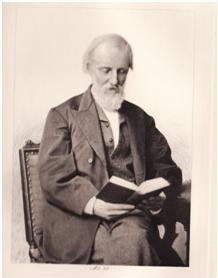Henry Ingersoll Bowditch facts for kids
Quick facts for kids
Henry Ingersoll Bowditch
|
|
|---|---|
 |
|
| Born | August 9, 1808 |
| Died | January 14, 1892 (aged 83) |
| Occupation | physician |
| Known for | abolitionism |
| Relatives | Nathaniel Bowditch (father) |
| Signature | |
Henry Ingersoll Bowditch (born August 9, 1808 – died January 14, 1892) was an American doctor. He was also a very important Christian leader who fought against slavery.
Henry was born in Salem, Massachusetts. His father, Nathaniel Bowditch, was a famous mathematician. Henry went to Harvard College and became a doctor there in 1832. After that, he studied medicine in Paris for two years with leading doctors. From 1859 to 1867, he taught medicine at Harvard. He later started the Massachusetts State Board of Health, which helps keep people healthy. Bowditch was a member of the American Academy of Public Health. He wrote an important book about public health called Public Hygiene in America.
Contents
Early Life and Fighting Slavery
In 1833, while in England, Bowditch saw the funeral of William Wilberforce. Wilberforce was a strong supporter of ending slavery. Soon after returning to Boston, Bowditch announced that he was against slavery.
Because of this, many people, including close friends, started to avoid him. They would even stare or frown at him without speaking. His medical practice also lost patients. But Bowditch remained dedicated to the movement.
Standing Up for What's Right
Bowditch was a very active and passionate abolitionist. He gave many talks and spent time with other leaders who fought against slavery. These included Charles Sumner, Charles C. Emerson, and Frederick Douglass.
He briefly worked at the Warren Street Chapel, a charity for poor children. However, he left because the charity only helped white children. Bowditch believed this was wrong. He felt angry at religious groups that refused to fight racism and slavery.
Taking Action Against Slavery
Henry Bowditch also helped enslaved people who had escaped. He became a founder of the Latimer Committee. He also helped edit The Latimer Journal. Both were created to help George Latimer. Latimer was an escaped slave who was caught and faced being sent back South.
Bowditch's efforts led to many people signing petitions. These petitions went to the Massachusetts legislature. As a result, a new law was passed. This law stopped state and city jails from holding escaped slaves. This was a big setback for slave-hunters. However, Bowditch still saw many escaped slaves unfairly sent back to the South.
Forming the Anti-Man-Hunting League
In response, he started the Anti-Man-Hunting League. This group was quite radical. Its members were trained to capture slave-hunters. They would hold them until an escaped slave was set free.
The league never got to use this plan. But it helped bring together men who were against slavery. It also prepared them for the violent conflict against slavery that came with the Civil War. Bowditch was also part of the Boston Vigilance Committee. This group helped escaped slaves.
After the Civil War, Bowditch continued to be involved. He shared his views on the history of abolitionism. He was very supportive of John Brown, another strong anti-slavery fighter.
Contributions to Medicine and Public Health
Bowditch also made important contributions to science and public health. He brought a new way of thinking to American medical science. This was called inductive reasoning, which means using observations to form theories.
He also helped make the stethoscope popular. This tool helps doctors listen to sounds inside the body. He helped us understand tuberculosis, a serious lung disease. He also set up the Massachusetts State Board of Health, which was very important for public health.
Improving Medical Care
He wrote books like Preventive Medicine and the Physician of the Future. This book promoted inductive reasoning in medicine. He also wrote Public Hygiene in America to explain ideas about state health. He even served as president of the American Medical Association.
During the Civil War, his son Nathaniel was wounded. He died after being left on the battlefield for a long time. Bowditch used his son's death to raise awareness. He published a pamphlet and helped create public demand for a regular ambulance service. This service was finally started by the Union Army in the last year of the war. It helped spread the "Letterman system" of caring for wounded soldiers across the entire Union army.
See also
- William Francis Channing
 | Madam C. J. Walker |
 | Janet Emerson Bashen |
 | Annie Turnbo Malone |
 | Maggie L. Walker |

